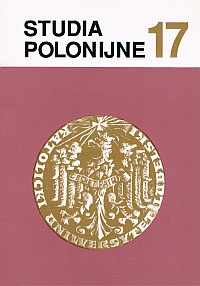Polskie rodziny i australijska szkoła: zderzenie wartości
Main Article Content
Abstrakt
The paper undertakes the problem of the role the Australian educative system played in the process of social and cultural integration of the Polish emigrants who came to Australia after 1980. The Polish and Australian systems of education are confronted from the point of view of humanistic sociology. The author (together with his research group) grounds his analyses on the interviews conducted among 20 Polish families. He concentrates on the statements in which Polish parents evaluate education as an essential value inherited from the Polish socio-cultural system. Then he reveals their attitudes and aspirations concerning further education and career of their children within the social system of Australia. The paper presents also the parents' evaluation of the Australian school. This is done from the point of view of knowledge as a function of the future position their children will take within society and in terms of their profession. These issues have been preceded by a broad analysis of the cultural situation of the Polish population in polyethnic Australia.
The Polish parents' aspirations as regards their children's career in Australia were conditioned by two factors: the level of education the parents had acquired in Poland and their current employment. Four categories of attitudes have been presented here: a) the parents with higher education, employed in accordance with their qualifications, expected of their children to graduate, which was to guarantee them a respective social status; b) the parents with higher education, but working as unqualified workers (especially fathers), manifested a strong tendency to educate their children at a university level as a way to regain through their children the high social position which they themselves had lost; c) the parents with secondary education, working as unqualified workers, manifested least aspirations to educate their children at universities, stressing their career and level of income; d) the parents with the lowest level of education manifested the highest aspirations to educate their children.
Most subjects were dissatisfied with the level of Australian education, claiming that it provided too little knowledge and failed to promote the model of a graduate as a "well-educated person", which they themselves accepted, according to the Polish system of socio-cultural values.
In the third part the paper presents the study of adaptation and achievements of the pupils of Polish origin in senior grades of Australian secondary schools of various types. On the grounds of the interviews conducted among 105 students the findings concerning their school achievements have been compared, their command of the English language, their plans as regards future career, the study of the Polish language, sense of identity, and their evaluation of social acceptance.

